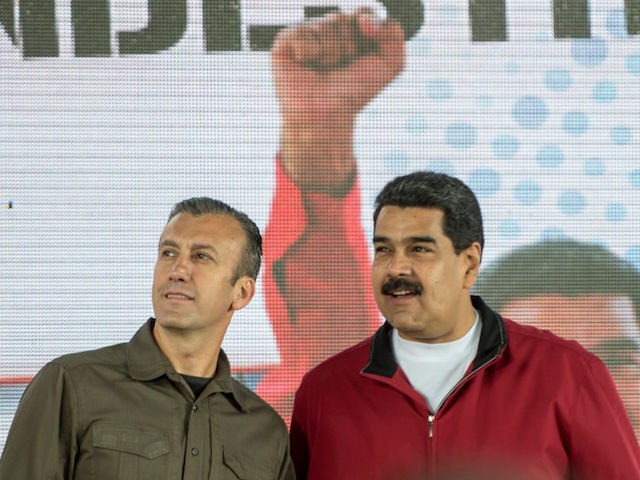Venezuelan dictator Nicolás Maduro appointed senior official Tareck El Aissami – wanted by ICE for drug trafficking and widely believed to be Maduro’s primary link to Hezbollah – the country’s oil minister on Monday.
El Aissami – who has served in a wide variety of cabinet-level positions, including vice president – was previously in the position of Minister of Industries and National Production, which gave him power over Venezuela’s oil production, but also key natural resources such as gold. Illegal gold mining enabled by the illegitimate Maduro regime has empowered violent gangs in the country and caused an environmental disaster.
Now, El Aissami will be tasked with saving what is left of the formerly lucrative Venezuelan oil industry after two decades of catastrophic socialist mismanagement, exacerbated by the collapse in oil prices triggered by global lockdowns to combat the Chinese coronavirus pandemic. It is not clear what will happen with his former office, if someone will be appointed to succeed him or if it will be integrated into the bureaucracy of his new position.
Organized crime experts have signaled El Aissami out for years as an associate of the Iranian-Lebanese jihadist outfit Hezbollah. While not considered a jihadist operator, El Aissami is believed to be a major fundraiser and recruiter for the organization, one of the most important in Latin America.
El Aissami generates those funds through drug trafficking, according to the United States government. The U.S. Department of the Treasury sanctioned El Aissami under the “Drug Kingpin Act” in 2017 for “playing a significant role in international narcotics trafficking.” Among his jobs, the Treasury claimed El Aissami “facilitated shipments of narcotics from Venezuela, to include control over planes that leave from a Venezuelan air base, as well as control of drug routes through the ports in Venezuela.”
In July, ICE put out a wanted alert for El Aissami repeating several of these accusations.
“He facilitated shipments of narcotics from Venezuela, to include control over planes that left from a Venezuelan air base and drug routes through the ports in Venezuela,” ICE stated. “In his previous positions, he oversaw or partially owned narcotics shipments of more than 1,000 kilograms from Venezuela on multiple occasions, including those with the final destinations of Mexico and the United States.”
#MostWantedWednesday Have you seen this #mostwanted #fugitive? He's wanted for international narcotics trafficking. https://t.co/mH0f1lVG0Q pic.twitter.com/cHmCEK5Vmt
— ICE (@ICEgov) July 31, 2019
The U.S. government is offering a $10 million reward for El Aissami’s capture.
El Aissami denies the charges against him.
Maduro made the announcement promoting El Aissami in the latest official gazette of the United Socialist Party of Venezuela (PSUV). According to the state-run television outlet VTV, El Aissami will “lead the restructuring and reorganizing of the Ministry of Popular Power of Oil, with the goal of adopting the necessary measures to guarantee national energy security and protect the industry from the external and internal multiform aggression executed to affect oil production and commercialization in the country.”
The latter appears to be a reference to American-led sanctions against the Maduro regime. Maduro ceased being the legitimate ruler of Venezuela in January 2019, after his last term ended. As he refused to vacate the executive seat, the national legislature selected an interim president, Juan Guaidó. While remaining, to this day, the legitimate president of Venezuela, Guaidó has failed to galvanize national support and some reports suggest he continues to seek unpopular dialogues with Maduro’s criminal organization.
In response to Maduro’s ongoing illegal presence at the helm of the country and the many criminal acts attributed to his regime – including drug trafficking and funding of terrorism – the administration of President Donald Trump has imposed severe sanctions on senior individuals in his administration. Maduro blames those sanctions for the poor state of the Venezuelan oil industry.
In this week’s socialist gazette, Maduro also announced that he would appoint a cousin of late dictator Hugo Chávez, Asdrúbal Chávez, as the president of Petróleos de Venezuela (PDVSA), the state-run oil company. These promotions will result in the ouster of incumbent Manuel Quevedo who, as al-Arabiya notes, was responsible for overseeing a 65-percent collapse in national oil production.
Venezuela began the year with nationwide gasoline shortages, a product of the collapse in production at the hands of PDVSA. While the state-run company survived years of mismanagement under Chávez in part due to high oil prices, Maduro’s decision to replace many seasoned oil industry veterans with unskilled socialist cronies resulted in poor development of the labor needed to get the oil out of the ground.
Experts estimated in February that, under Maduro, oil production had declined to levels the country had not seen since 1945.
The Chinese coronavirus pandemic, which has resulted in a record decline of oil prices, has created a situation in which many Venezuelans are openly defying Maduro’s quarantine measures to stand in line for their gasoline rations to be able to fuel their vehicles and buy limited available supplies of food.
Venezuela possesses the world’s second-largest known oil reserves after the United States.

COMMENTS
Please let us know if you're having issues with commenting.